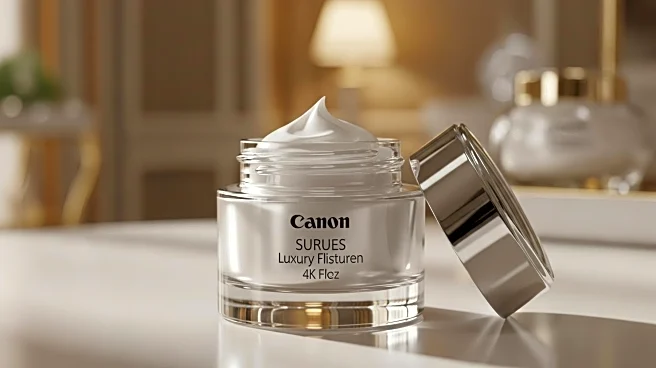What's Happening?
Dr. Diamond's Metacine, co-founded by Los Angeles-based plastic surgeon Dr. Jason Diamond, is launching a new product, the Hydr/o Bioactive Hydrolipid Barrier Moisturizer. This moisturizer, priced at $300, will be available on the brand's website starting September 23, followed by a rollout to retailers such as Bluemercury and Nordstrom, and later on Amazon. Despite a general slowdown in luxury skincare demand in the U.S., Metacine is experiencing growth with new and repeat customers. The moisturizer is inspired by Dr. Diamond's in-office treatments and is part of the InstaFacial collection, which mimics his proprietary treatment combining laser, platelet-rich plasma, and microneedling.
Why It's Important?
The launch of Metacine's new moisturizer highlights the brand's ability to thrive in a challenging luxury skincare market. This expansion could signal a shift in consumer preferences towards treatment-inspired skincare products. The anticipated sales of $3.5 to $4 million in the first year suggest strong market interest. The product's formulation, featuring bioactive hydrolipid infusion and multiple biomimetic micro-molecules, underscores the trend towards scientifically advanced skincare solutions. This development may influence other luxury skincare brands to innovate and adapt to changing consumer demands.
What's Next?
Metacine plans to invest heavily in marketing, including digital and social campaigns, out-of-home activations, and a private event in New York to promote the launch. The brand's strategy to leverage Dr. Diamond's patients as informal focus groups for feedback could enhance product development and customer satisfaction. As the moisturizer becomes available through major retailers and online platforms, Metacine's market presence is likely to expand, potentially setting new standards in luxury skincare.
Beyond the Headlines
The introduction of Metacine's moisturizer may reflect broader trends in the skincare industry, where consumers increasingly seek products that offer clinical benefits and align with professional treatments. This could lead to ethical considerations regarding the marketing of such products and their accessibility to a wider audience. Additionally, the emphasis on bioactive ingredients may drive further research and innovation in skincare formulations.












